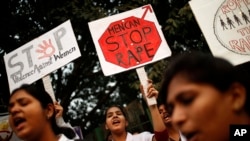Indian authorities have blocked the screening of a BBC documentary amid a massive outrage over a controversial interview with one of the rapists in the brutal gang rape that shook the country two years ago.
But some say the solution does not lie in banning the film, but in changing a social mindset that devalues women.
Saying that women who go out at night have only themselves to blame, Mukesh Singh -- one of the six men who raped a 23-year-old physiotherapy student in December 2012 -- told a BBC filmmaker that “a girl is far more responsible for rape than a man.”
Singh is in New Delhi’s Tihar Jail as he appeals his death sentence for the gang rape of Jyoti Singh on a bus she boarded after watching a film at night. Showing no remorse, he told filmmaker Leslee Udwin that had Jyoti Singh not resisted the rape, they would not have inflicted the savage beating that led to her death.
Airs March 8
The hour-long documentary, “India’s Daughter,” in which the interview is being featured, is scheduled for broadcast by BBC Four on March 8. An Indian TV channel was also to telecast the film.
But as massive outrage erupted over Mukesh Singh’s comments, police moved swiftly to block his interview, saying it could create “an atmosphere of fear and tension with the possibility of public outcry.”
Television channels have been advised not to broadcast the film.
Home Minister Rajnath Singh accused the filmmakers of violating the conditions under which permission was given for the interview.
“It was noticed that the documentary film depicts the comments of the convict which are highly derogatory and an affront to the dignity of women,” Rajnath Singh said.
For once, prominent women activists were on the same page as the government, decrying the film for what they said amounted to giving a platform to a rapist and a murderer.
Ranjana Kumari, who heads the Center for Social Research in New Delhi, said Mukesh Singh’s response was typical of widespread attitudes among men.
“I don’t think that any discovery has been made by what he has released (said). This is what this mindset is all about. If at all, any interview was to [have] been done, it should have been from a psychiatrist purpose, or for a sociologist to analyze," Kumari said.
"To bring this kind of an interview out, and then to play it and sell it, I think this is totally unacceptable. It is really a violation of dignity of women,” she said.
Filmmaker questioned
The outrage is not just over the rapist’s comments -- angry questions are also being raised over why a foreign filmmaker was granted permission to interview Mukesh Singh and other rapists in jail.
Filmmaker Udwin defended the film at a special screening of the movie held on New Delhi Tuesday, before it was banned. Udwin, herself a sexual assault victim, said she had the necessary approvals and is saddened by the move to ban it.
The movie, which reconstructs the events of the night of the gang rape, also has interviews with the Jyoti Singh's parents, lawyers and a doctor.
Udwin said she was shocked by the way Mukesh Kumar views women.
“And that is what is extremely shocking. Not what he did, but what he thinks that led him to do what he did. And it is not just he who thinks that, it is a societal problem," the filmmaker said. "No regret for one second out of in 16 hours, no regret. In fact, the opposite. Mukesh’s attitude is ‘Why are they making a fuss about us, everybody is doing it,’ ” Udwin said.
Amid the outcry raised over the interview, some voices point out that one of the central issues the film highlights is being lost: the mindset of a society that devalues women.
Filmmaker Javed Akhtar questioned the furor over the documentary and the anger over the rapist’s comments -- that woman invite trouble if they roam around at night.
He said he is glad the documentary has been made, so that millions of Indian men can understand that they also think the same way as the rapist does. He said that if these men dislike what Mukesh Singh said, they should change their mindsets.
'Confront the issue'
Lawmaker Anu Aga, who is also a businesswoman and social worker, echoed similar sentiments.
“Banning this movie is not the answer. We have to confront the issue, that men in India do not respect women, and any time there is a rape, blame is put on the woman, that she was indecently dressed, she provoked the man. It is not just the man in the prison’s view, it is the views of many men in India. Let’s be aware of it and lets not pretend that all is well,” Aga said.
As the infamous gang rape once again comes onto center stage, others, including the parents of the gang rape victim, are asking agonized questions about why the case has not yet drawn to a conclusion though over two years have passed since the incident.
While a fast-track court delivered the verdict in what is a record for India -- nine months -- the appeal of the convicted men is pending in the Supreme Court.




